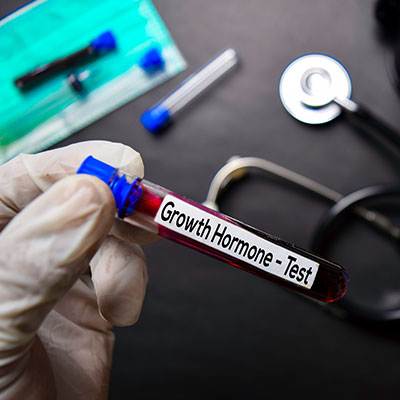HGH Therapy for Men
HGH replacement therapy is used to treat men suffering the debilitating effects of age-related growth hormone deficiency.
Human growth hormone (HGH) has many important benefits for men. HGH is second only to testosterone as the most critical hormone to a man’s strength, vitality, and overall health and well-being.
However, as vital as HGH is to man’s vigor and overall health, it is an unfortunate fact of life that – like testosterone – a man’s level of HGH drops as he ages. This steady decline of HGH leads to what is known as “adult-onset HGH deficiency,” or more accurately, “age-related HGH deficiency.
Age-related HGH deficiency can result in loss of strength and vitality, increased fat, and loss of muscle tone and bone density. Low levels of growth hormone can even cause sexual wellness issues such as low sex drive and erectile dysfunction.
Growth hormone therapy can stop, and in many cases, even reverse these problems.
Why Does Your Growth Hormone Level Decline With Age?
HGH is a hormone produced by the pituitary gland. HGH stimulates growth in children and teens and helps to maintain muscle mass and bone strength throughout life. Despite the fact that adults need growth hormone, the older you get, your HGH levels get lower and lower.
Growth Hormone Levels begin to drop substantially as you reach middle age. If you are over 30 and are feeling tired, fatigued, or are experiencing sexual wellness issues, you may have a growth hormone deficiency or GHD.
Doctors recognize different kinds of growth hormone deficiencies. GHD can be “congenital,” or present at birth, or “acquired,” meaning that it develops later in a child’s life. There is another type of GHD known as an “Idiopathic GHD,” which is a GHD that seems to have no known cause.
What is Growth Hormone Deficiency?
A growth hormone deficiency (GHD) occurs when your body does not produce enough human growth hormone (HGH). Both children, men, and women can suffer from growth hormone deficiency.
Growth hormone is produced by the pituitary, a small gland at the base of the brain. A growth hormone deficiency occurs when for some reason, your pituitary is not making adequate supplies of HGH.
Growth hormone is essential for a child to grow into a healthy adult of full stature. However, adults, as well as children, can suffer from GHD. This is why doctors refer to two different categories or types of growth hormone deficiency:
- Child-onset GHD, which is present at birth or starts in childhood. This kind of GHD can be carried into adulthood.
- Adult-onset GHD, which develops in adulthood. Adult-onset GHD is sometimes also referred to as “age-related GHD.”
No matter when it occurs or what type of GHD it is, growth hormone deficiency is always the result of something that causes your pituitary not to make enough HGH. The poor pituitary function could be the result of genetic defects, disease conditions such as cancer, or disease or injury to the brain. GHD can also be affected by lower levels of other hormones that influence pituitary function.
Is Growth Hormone Deficiency Dangerous?
Growth hormone deficiency (GHD) is a rare disorder characterized by the inadequate secretion of HGH from the anterior pituitary gland, a small gland located at the base of the brain that is responsible for the production of HGH, among several other hormones.
Growth hormone deficiencies can be minor or severe and, as such, can cause varying degrees of health problems. GHD can be most serious in children. Children with GHD may present with delayed rates of development of facial bones, slow tooth eruption, delayed lengthening of long bones, fine hair, and poor nail growth. They may also demonstrate truncal obesity, a high-pitched voice, and delayed closure of the sutures of the skull, causing delayed closure of the fontanelles.

The list of diseases that can be caused or aggravated by HGH deficiency include:
- Increased risk of cardiovascular disease.
- Increased risk of death from a cardiovascular event.
- Increased risk of metabolic syndrome: high blood pressure, elevated insulin levels, excess belly fat, and abnormal cholesterol levels.
- Increased risk of clinical depression.
- Strong association with diabetes.
- Strong association with high cholesterol and atherosclerosis (hardening of the arteries).
- Association with more aggressive variants of cancer.
What Are the Normal Levels of Growth Hormone by Age in Males?
Experts have agreed upon different HGH levels that are considered to be “normal,” “low,” and “high” in men. However, you may see different sources showing varying levels of growth hormone to be “too low,” “too high,” or normal.
You need not be overly concerned if you should fall slightly out of the “normal” range for his HGH levels according to one chart vs. another. This is just common variability and exactly why HGH levels are given as a range. Also, keep in mind that what could be considered normal for you – may be a “low” or “high” HGH level for someone else.
On the other hand, however, if your HGH levels do fall greatly below the “normal” range, no matter what chart you are looking at, then chances are you may be a very good candidate for HGH replacement therapy.
HGH Levels In Men: A Chart
Age | High Levels of HGH | Normal Levels of HGH | Low Levels of HGH |
Men over 30 | > 1,009 ng/dL | 219 – 1009 ng/dL | < 219 ng/dL |
Men over 40 | > 993 ng/dL | 201 – 993 ng/dL | < 201 ng/dL |
Men over 50 | > 918 ng/dL | 170 – 918 ng/dL | < 170 <ng/dL |
Men over 60 | > 700 ng/dL | 156 – 700 ng/dL | < 156 ng/dL |
Again, remember that if your levels fall out of the range considered “normal” as referenced above, do not panic. Talking to your doctor about how your growth hormone levels may be affecting you is your first line of defense against poor health. The easiest way to help men with age-related HGH deficiencies is by getting the proper prescription for authentic growth hormone from a licensed doctor.
Symptoms of Growth Hormone Deficiency in Men
The signs and symptoms of growth hormone deficiency in adult males can include:
- A higher level of body fat, especially around the waist
- Anxiety and depression
- Decreased sexual function and interest
- Fatigue
- Sexual health issues
- Greater sensitivity to heat and cold
- Less muscle (lean body mass)
- Less strength, stamina, and ability to exercise without taking a rest
- Reduced bone density, greater risk of osteoporosis
- Changes in the makeup of the blood cholesterol
People with adult-onset GHD also tend to be at a higher risk for cardiovascular disease because they tend to have higher levels of LDL (bad) cholesterol, as well as they also tend to have higher triglyceride levels.
As a child and through your teen years, HGH levels are very high. This is due to the enormous amounts of HGH that are required for a boy to physically grow and mature into a man. HGH levels continue to rise as a boy hits puberty. A man’s HGH levels will peak at around the age of 20. However, after 30, HGH levels start to drop. By the time a man is over 35, HGH levels may have dropped off significantly, causing age-related GHD. Most men over 40 are suffering the symptoms of age-related GHD to some degree.
Age-related GHD impacts a man’s sexual wellness. It also leads to:
- Decreased energy
- Weight gain
- Lack of ability to build lean muscle
- A decrease in bone density and an increased risk of fractures
- Sleep problems
- Mood swings
- Cognitive difficulties
Can Women Suffer From Growth Hormone Deficiency?
Yes, HGH is as vital to women as it is to men, and women can also suffer from age-related HGH deficiency. The good news is that women, also just like men, can benefit from growth hormone replacement therapy.
Women, too, achieve all of the beneficial long-term effects from HGH therapy listed above for men. In addition, some for the specific positive long-term effects of growth hormone therapy unique to women include:
- Improved hair health
By rejuvenating cells and improving collagen production, HGH improves hair health, giving women a thicker, more youthful-looking head of hair.
- Improved skin health
HGH’s ability to rejuvenate cells and its aforementioned ability to enhance collagen production also fights wrinkles and “creepy skin.” In women, HGH restores skin elasticity, giving skin a warm and more youthful glow.
- Reduction of cellulite
Since HGH also improves a woman’s ability to burn fat, it can lessen ugly fat deposits below the skin that lead to the appearance of cellulite.
- Improved libido
HGH improves libido in women by increasing the brain’s ability to produce endorphins and other “feel good” chemicals related to sex drive and sexual pleasure.
- Vaginal dryness and painful intercourse
HGH can rejuvenate the cells of vaginal tissues, leading to improved lubrication and increased sexual satisfaction.
In addition to the HGH benefits for women listed above, HGH therapy is often combined with other hormone replacement therapies typically used to treat menopause. HGH therapy can help to alleviate some of the most debilitating symptoms of menopause, such as mood swings, night sweats, and hot flashes.
What to Do If You Have Growth Hormone Deficiency

If you are found by any method to be suffering from growth hormone deficiency, the only real treatment is growth hormone replacement therapy. Growth hormone replacement therapy is designed to make up for the HGH that your body can no longer make for itself inadequate supply.
You must have a prescription for authentic HGH replacement therapy. Any product you can purchase without a prescription or in any other form other than an injection such as a pill or powder – is not real HGH. You cannot legally buy HGH injections online without a prescription. Any HGH injections that you see for sale online that you can purchase without a prescription are being sold illegally on the “black market.” Such products should be avoided. Using HGH obtained from illicit sources can be hazardous to your health or even fatal.
Growth Hormone Therapy
Growth hormone therapy is used to treat men as well as women who are suffering from age-related growth hormone deficiency.
HGH replacement therapy must be prescribed by a doctor. Growth hormone replacement therapy can bring your HGH levels back to what is normal for you. All HGH therapy for men is given by a prescription medication called Somatotropin. It is only given via injections. All Somatotropin is made from human DNA, so it is biologically identical to the HGH made by your body.
There are different brands of prescription HGH available for sale in the US. They differ mainly in their available dosages and delivery methods. While any brand of HGH must be injected, some use traditional syringes, and others use injectable devices.
The dosage of growth hormone used to treat adult-onset GHD will vary depending on your age, weight, medical history, lifestyle, and overall wellness goals.
Key Benefits of HGH Replacement Therapy
For men between the ages of 35 and 65, HGH therapy has many benefits. HGH replacement can minimize or reverse most if not all of the above symptoms of age-related growth hormone deficiency in men.
When to start HGH therapy depends on the extent of your symptoms. The older you are, the worse your symptoms are likely to be. Therefore, men over 50 will likely receive all of the benefits of HGH, while men over 30 may only have benefits that address their fewer symptoms. However, no matter your age, any man over 35 who is experiencing the symptoms of GHD could benefit from HGH. Dr. Ronald Klatz, former president of the American Academy of Anti-Aging Medicine, wrote in his book, Grow Young with HGH, “Growth hormone is the only anti-aging treatment known that actually makes men look and feel younger.”

As you enter the second and third months of HGH therapy, your strength and stamina will continue to improve; you will sleep better and start to lose weight and put on more lean muscle. You will probably also start to experience better moods and an overall improved sense of well-being.
By the time you complete your initial six months of growth hormone therapy, you can expect to have achieved all of the benefits of prescription HGH, including:
- Increased sexual desire, faster arousal, improved erectile functions, and more powerful orgasms
- Stronger bones and muscles
- Reduced joint pains and bodily stiffness
- Better focus, cognitive performance, and memory
- Improved metabolism, lipolysis, and fat loss
- Deeper sleep
- Increased energy and endurance
- Lower LDL and total cholesterol and blood pressure levels
- Firmer, younger-looking skin
- Faster, thicker hair growth
- Improved motivation and performance
- Better heart health
- Stronger immune system functions
Perhaps the benefit of HGH therapy of most interest to men is the positive impact HGH can have on a man’s sexual performance. Studies have clearly shown that HGH therapy can boost a man’s sex drive as well as provide relief from erectile dysfunction. How HGH does this is not entirely clear. However, one recent study found that HGH therapy increases nitrous oxide production. Nitrous oxide is instrumental in getting and obtaining an erection. Studies have also found that growth hormone therapy can increase testosterone. Low testosterone is a known contributing factor to ED.
How to Start HGH Therapy for Men
You cannot start on growth hormone therapy without a doctor’s prescription. However, getting a prescription for growth hormone injections — if you truly need one — is not that difficult. In fact, it only takes these five simple steps.
- Step 1 – Fill out an online medical history form – This first step is indeed the only step in the process of getting HGH injections that can be done online.
- Step 2 – See a doctor –If your online medical history form indicates that you are a good candidate for HGH therapy, the next step is to see your doctor. He or she will discuss your medical history in further detail, ask you more about your symptoms, and take a complete physical exam.
- Step 3 – Laboratory hormone testing – Once you have completed your physical exam, you will be referred to a laboratory to have the hormone levels in your blood tested.
- Step 4 – You will obtain a prescription for a program of HGH injections – If the results of your laboratory tests indicate that you have an HGH deficiency, your doctor will prescribe a dosage of growth hormone injections to suit your needs and lifestyle.
- Step 5 – Your HGH will be delivered to you – Your prescription for HGH therapy will be forwarded to one of the pharmacies we work with that specializes in filling prescriptions for HGH injections for adults with age-related growth hormone deficiency.
Now that you know a lot more about growth hormone therapy for men, why not contact us today, and see if you can benefit from the life-changing benefits of HGH replacement therapy.


